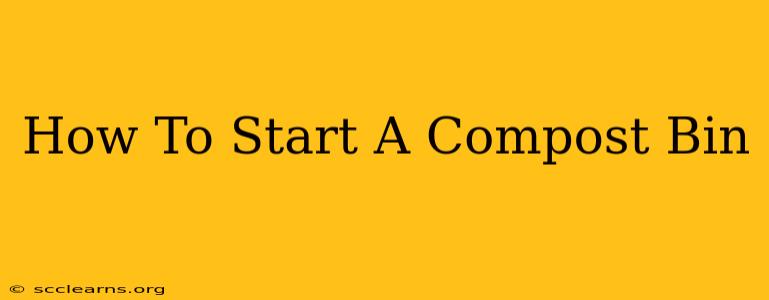Want to reduce your environmental impact and enrich your garden soil? Starting a compost bin is easier than you think! This comprehensive guide will walk you through the process, from choosing the right bin to maintaining a healthy compost pile. Learn how to turn kitchen scraps and yard waste into valuable compost for your plants.
Choosing Your Compost Bin
The first step is selecting the right compost bin for your needs and space. Several options exist:
Types of Compost Bins:
- Tumbling Composters: These rotating bins make mixing easy and are great for smaller spaces. However, they can be more expensive than other options.
- Static Bins: These bins are typically made of wood, plastic, or metal and are stationary. They're more affordable but require more manual mixing.
- DIY Compost Bins: If you're handy, you can build your own bin from readily available materials like pallets or wire mesh. This is the most cost-effective option.
- Worm Composting (Vermicomposting): This method uses worms to break down organic matter. It's ideal for smaller spaces and produces a nutrient-rich "worm castings" compost.
Consider these factors when choosing:
- Size: Choose a bin that's appropriately sized for the amount of waste you produce.
- Material: Consider durability, aesthetics, and ease of maintenance.
- Location: Select a location that's easily accessible and receives some shade.
What to Compost: The Ultimate Guide to Compostable Materials
Successfully composting relies on a good balance of "greens" and "browns."
Greens (Nitrogen-Rich):
- Kitchen scraps: Fruit and vegetable peels, coffee grounds, tea bags (remove staples), eggshells.
- Grass clippings: Freshly cut grass makes a great addition.
- Leaves (in moderation): While leaves are "browns", fresh green leaves provide nitrogen.
Browns (Carbon-Rich):
- Dried leaves: These are essential for balancing the moisture content.
- Shredded paper and cardboard: Avoid glossy or colored paper.
- Small twigs and branches: These should be shredded or chopped for faster decomposition.
- Sawdust (untreated): Ensure the sawdust is from untreated wood.
Materials to AVOID:
- Meat, dairy, and oily foods: These attract pests and create foul odors.
- Diseased plants: These can spread disease to your compost and garden.
- Pet waste: Contains harmful bacteria and parasites.
- Treated wood: Contains chemicals harmful to plants and the environment.
Setting Up Your Compost Bin: A Step-by-Step Guide
Once you've chosen your bin and gathered your materials, follow these steps:
- Layer it up: Start with a layer of coarse brown materials (like twigs or shredded cardboard) at the bottom for drainage.
- Alternate layers: Create alternating layers of greens and browns, maintaining a roughly equal proportion. Aim for a slightly moist consistency – like a damp sponge.
- Maintain moisture: Regularly check the moisture level. Add water if it's too dry.
- Turn regularly: Turn your compost every few weeks to aerate it and speed up decomposition. This is crucial for a successful compost pile.
- Monitor temperature: The ideal temperature for composting is around 130-160°F (54-71°C). A thermometer can help you monitor the process.
Troubleshooting Common Compost Problems
- Slow decomposition: This could be due to too many browns, insufficient moisture, or lack of aeration. Try adding more greens, water, and turning more frequently.
- Foul odor: This suggests too much moisture or the presence of inappropriate materials (meat, dairy). Aerate the pile, remove offending materials, and add more browns.
- Pest infestation: This is less common with proper composting technique. Remove any visible pests and ensure adequate aeration.
Harvesting Your Compost: The Rewards of Your Efforts
Once your compost is dark brown, crumbly, and earthy-smelling (generally 6 months to a year), it's ready to use! This rich, nutrient-rich material is a fantastic addition to your garden beds and potted plants.
By following these simple steps, you can easily start your own compost bin and enjoy the benefits of home composting – a greener garden and a smaller environmental footprint. Happy composting!

